Get to know the names, faces, and inspirations behind participants in the Equity Changemakers Institute! The program, developed by the Center for Health Care Strategies, is designed to bolster the capacity of public sector leaders who oversee agency efforts to advance health equity by helping them strengthen the skills to drive transformational change and positively impact the health of those who live in their states.
View participants using the following map. For bios, select a class year from below the map.

View Class of 2024 bios below or download a PDF version.
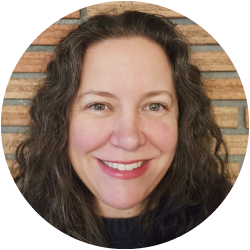
Sarepta Archila (she/her)
“I am inspired to work with others to improve systems by the resilience I see in the community and by the resourcefulness of helping professionals who stand ready.”
Sarepta Archila, LPC, MS, is the Certified Community Behavioral Health Clinic (CCBHC) Project Director at the Georgia Department of Behavioral Health and Developmental Disabilities. In this role, she is responsible for leading the state’s efforts to increase access to high-quality, sustainable, and accountable integrated health care via the CCBHC model. Sarepta is an experienced mental health professional with a passion for workforce support and development.
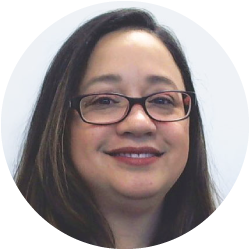
Rebecca (Becky) Carrell (she/her)
“I am motivated by the innovative teams I am privileged to work with and the knowledge that the results of our efforts have a positive impact on the people of Washington State.”
Becky Carrell is the Deputy Division Director for the Medicaid Programs Division at the Washington State Health Care Authority. In this role, she focuses on leading teams implementing new programs and policies. She is also responsible for ensuring the initiatives and work of the division align with the agency’s commitment to providing equitable access to integrated, whole-person care that is person- and community-centered. As a leader in the agency, Becky is committed to continually looking for ways to incorporate the voices of the communities impacted by the Washington Apple Health (Medicaid) program.
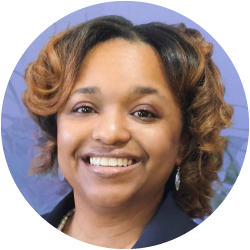
Airregina Clay (she/her)
“I am inspired by the potential of equity-centered data practices, programs, and policies to foster healthier and empowered communities – this fuels my passion every day.”
Airregina Clay, MPAL, is a program manager at the CDC Foundation, supporting the Massachusetts Department of Public Health (MDPH), leading inter-agency training and adopting equity-centered demographic data practices. A first-generation college graduate, she demonstrates commitment to transformative leadership, and champions equity in governmental decision-making. Previously a health policy analyst, Airregina also has experience in non-profit management and positive youth development. She leverages artistic mediums to inspire and educate.
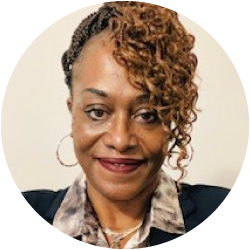
Danita Coulter (she/her)
“My intrinsic desire to share knowledge and involve others about how we can collaboratively impact and improve the lives of many serves as my inspiration for equity work.”
Danita Coulter, MSW, is the Branch Manager, Equity and Determinants of Health in the Division of Quality and Population Health at the Kentucky Department for Medicaid Services. In this role, she oversees the development and implementation of the equity vision and strategic plan, specifically focusing on social determinants of health and barriers impacting Medicaid enrollees. Danita has spent 17 years in the social services sector.
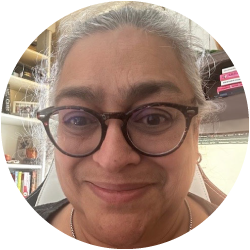
Kheya Ganguly (she/her)
“The people who are doing [equity] work inspire me with their passion and commitment to create a world where justice, equity, and inclusion is the rule rather than the exception.”
Kheya Ganguly, MA, is the Director of Trauma Prevention and Resilience Development in the Department of Mental Health at the Vermont Agency of Human Services. In this role, she builds departmental capacity for responding to trauma, provides training, and serves as a subject matter expert and advisor. Kheya has over 20 years as a grant writer and qualitative researcher. Kheya is a passionate advocate for resiliency, trauma responsive, and healing-centered care as well as diversity, equity, inclusion, and accessibility.
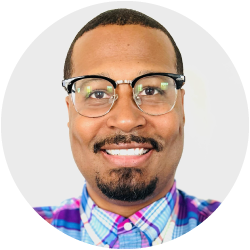
Aaron Green (he/him)
“Helping to shape and transform the lives of others is a responsibility I do not take for granted, and firmly believe that this is not hard work, but heart work.”
Aaron Green, MSM, MSW, is the Health Disparities and Equity, Diversity, and Inclusion Officer at the Colorado Department of Health Care Policy & Financing (HCPF) – Colorado’s state agency for administration of the Medicaid program, serving 1.6 million members. In this role, he crafts the strategic priorities and milestones to improve health equity and reduce disparities in care across the populations served by HCPF. Aaron is a proud social worker currently serving as adjunct professor at the University of Denver Graduate School of Social Work.
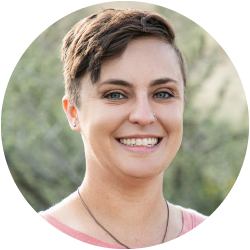
Libby Hobbs (she/her)
“I’m inspired and motivated by the people who work to make connections and identify the needs of our communities, rethink programs, and advocate to implement meaningful initiatives.”
Libby Hobbs, MPH, is a Program Manager at the Idaho Department of Health and Welfare, which houses the state’s Medicaid program. In this role, she provides contract management and oversight for managed care and service contracts to improve access and quality of services, as well as increase engagement with members and providers to build successful relationships. Prior to this role, Libby worked in cancer prevention in Idaho and tobacco and youth substance use prevention in Southwest Colorado.
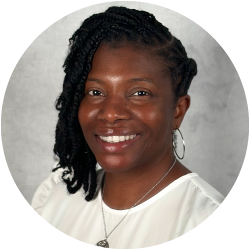
Latisha Kennebrew (she/her)
“I’m inspired to do this work every day from seeing how the impact of it is intentionally and necessarily changing communities for the better — it makes a difference. Our future is everything to me.”
Latisha Kennebrew, LBSW, MSW, is the Director of Health Equity and Minority Health at the Alabama Department of Public Health. In this role, she focuses on operations under a health equity lens, strategic planning, process improvement to address equity and inclusion, and outreach and engagement related to improving the health status of the populations served. Prior to this role, Latisha worked in various roles related to social work, including as a Senior Public Health Social Worker and Program Coordinator for the Office of Telehealth.
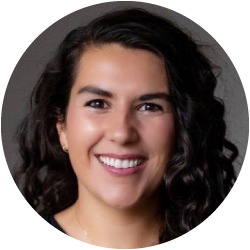
Sarah Lahidji (she/her)
“I am inspired by the opportunity to create systems of care and workplaces that are nurturing, accepting, and just, which enable all people to reach their fullest potential.”
Sarah Lahidji, MHA, is the Division Chief of Quality and Health Equity within California’s Department of Health Care Services, which administers the state’s Medicaid program, Medi-Cal. In this role, Sarah leads clinical quality and health equity initiatives, program evaluation, quality assurance, and performance improvement activities across programs and delivery systems serving members that receive care through Medi-Cal. Sarah has focused her career on the intersection of quality and health equity through previous roles at the University of California, San Francisco, and Kaiser Permanente.
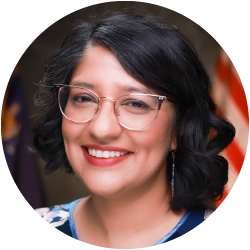
Hirah Mir (she/her)
“What inspires me in my work every day is knowing that people like me (immigrants, children of immigrants, Muslim Americans, low-income families) belong in government. What inspires me is knowing that any effort toward a more inclusive and just society is a worthwhile effort.”
Hirah Mir, PhD, is the Chief Diversity Officer at the New York State Office for People with Developmental Disabilities. In this role, she provides leadership and oversight of the agency’s operations, programs, and policy efforts toward diversity, equity, inclusion, accessibility, and cultural and linguistic competence. Hirah is an experienced data scientist who began her professional journey as a grassroots organizer for access to higher education for all. Her passion for equity comes from her experience being unhoused and receiving Section 8 housing, food stamps, and other important services for families living in poverty.
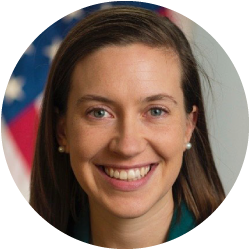
Laura Mortimer (she/her)
“Everyone deserves access to high-quality, affordable health care, and I am proud of the innovative, inclusive work Colorado is doing to make this possible.”
Laura Mortimer, MPP, is the Reinsurance and Health Insurance Affordability Enterprise Director at the Colorado Division of Insurance, where she leads the nation’s first state-based commercial health insurance subsidy program for undocumented immigrants. She also manages Colorado’s federal 1332 State Innovation Waiver, which provides funding to make health coverage more affordable and accessible to all Coloradans. Laura formerly led federal health care payment policy reform initiatives at the Centers for Medicare & Medicaid Services Innovation Center.
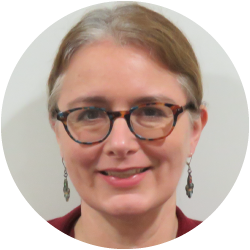
Michelle Niehaus (she/her)
“I am inspired by the opportunity and privilege to partner with colleagues and community members to co-create a more equitable Kentucky with communication access for all.”
Michelle Niehaus, LCSW, serves as the Program Administrator for Deaf and Hard of Hearing Services at the Kentucky Department for Behavioral Health, Developmental, and Intellectual Disabilities. A former community mental health center clinician, she now focuses on state and national level work to remove barriers and increase access to quality services with and for individuals from marginalized or underserved communities. Through collaboration, she strives for robust systems transformation grounded in community partnerships.
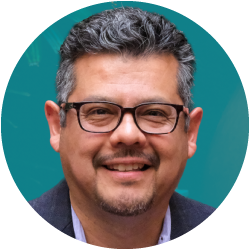
Alfonso Ramirez (he/him)
“What inspires me is the daily interactions with the people at work and in the community who are dedicated to centering and serving those most impacted by health inequity.”
Alfonso Ramirez, MA, is the Director of Behavioral Health Equity and Community Partnership at the Oregon Health Authority. He leads a team of health equity specialists and the behavioral health division in elevating the voices of communities most impacted by health inequity in all areas and systems within behavioral health. He is a former clinician, educator, and trauma-informed specialist who strives to build collective spaces that are humanizing, healing, and transformative.
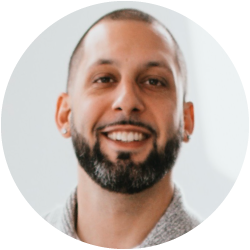
Joseph (Joe) Sullivan (he/him)
“I am inspired by a desire to uplift those from communities experiencing historical and contemporary injustices in the face of great opposition and resistance.”
Joe Sullivan serves as a Health Equity Policy Advisor for the Equity and Inclusion Division in the Oregon Health Authority. In this role, his primary areas of focus are community engagement and workforce development aimed at centering and elevating the voices of those most impacted by inequities. With over 12 years of public service experience, including roles in behavioral health, compliance, and quality assurance, Joe’s work contributes to the goal of eliminating health disparities in Oregon.

Jennifer (Jen) Trail (she/her)
“I’m inspired by the passion of local leaders who work tirelessly to build trust and truly collaborate with their community to make sustainable and systemic change.”
Jen Trail, MSW, LAPSW, is the Deputy Director for the Office of Strategic Initiatives at the Tennessee Department of Health, where she champions cross-sector partnerships and community health improvement planning to build health equity and community resilience. Prior to this role, Jen coordinated collective impact work focused on preventing adverse childhood experiences in Nashville. Her work experiences include public health administration, non-profit management, child abuse prevention, and community organizing.
View Class of 2023 bios below or download a PDF version.
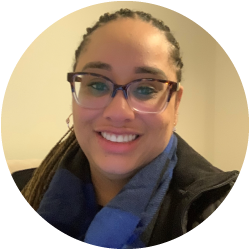
Ashley Bennett (she/her)
“I’m inspired to do this work every day by the countless community members who depend on good policies and programs that are transformative.”
Ashley Bennett, MPH, is the Health Equity Program Manager at the Washington State Healthcare Authority. In this role, she focuses on operations, strategic planning, and process improvement to address equity and inclusion and outreach and engagement related to improving the health status of the populations served. Prior to this role, Ashley was a mental health professional and crisis counselor and served as a New Jersey County Commissioner.
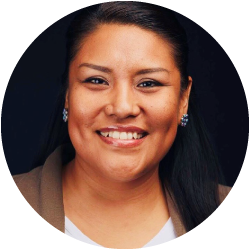
Eva Bighorse (she/her)
“I am motivated to advance access to health care and traditional lifeways for indigenous people everywhere, helping members of society live healthier, longer lives.”
Eva Bighorse is the Tribal Health Coordinator in the Arizona Division of Developmental Disabilities (DDD), where she administers the Division’s Fee-For-Service Tribal Health Program and oversees the Division’s subcontracted managed care health plans providing services to American Indians/Alaska Native DDD member populations. Eva is an Indigenous human development advocate with expertise in tribal relations. She has experience in strategic collaboration; working in multidisciplinary teams specializing in health care delivery and multi-stakeholder engagement; and serving children, youth, and adults living with disabilities in urban and rural areas, both on and off tribal land.
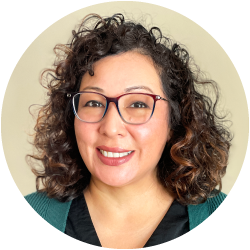
Rhiannon Blackdeer de Prado (she/her)
“I am inspired to be part of a team where we are actively learning and working collaboratively towards creating a meaningful and impactful change for the people we serve.”
Rhiannon Blackdeer de Prado, MA, is the Health Equity Director in the Direct Care and Treatment Administration at the Minnesota Department of Human Services. Her philosophy as a leader is using a collaborative approach to integrate a high commitment to continuous quality improvement and equitable changes to benefit the communities served. Rhiannon is a member of the Ho-Chunk Nation of Wisconsin.
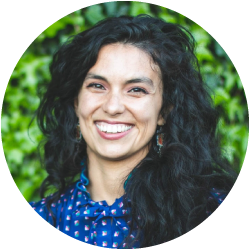
Alex Castillo Smith (she/they)
“I am so lucky to call New Mexico home and am inspired by how the safety net programs, benefits, and services provided by the Human Services Department truly transforms lives.”
Alex Castillo Smith, MPH, MSW, is the Acting Deputy Cabinet Secretary for the New Mexico Human Services Department, working with colleagues and community members to provide critical supports to half of New Mexico’s residents. Alex has a background working in federal disability rights, aging policy, and non-profit education, with experience on Capitol Hill and political campaigns. Alex is a first-generation Panamanian American, and a proud past recipient of safety net programs like SNAP and Medicaid.
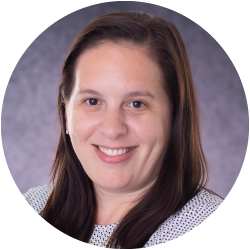
Carmelita Cruz (she/her)
“My family, friends, and people I’ve met in my journey fuel my dedication to pursuing justice, dismantling oppressive policies, and increasing access for underserved communities.”
Carmelita Cruz, JD, is the Executive Equity Officer at the New York State Office of Addiction Services and Supports (OASAS), where she leads the newly created Office of Justice, Equity, Diversity, and Inclusion (JEDI). Carmelita leads the development and execution of the agency’s equity vision and strategic plan and through her work centers internal equity and trauma-informed organizational change. The JEDI Office also leads work to reduce institutional racism through the development of equitable practices and policies within internal agency operations. The office supports external collaboration and continuous improvement with OASAS providers to develop and implement innovative JEDI strategies that provide measurable results.

Jeannie Jonas (she/her)
“It’s wonderful knowing that the work that I do today doesn’t just affect me, but positively impacts people across Oregon who need services, or who work for the state, for years to come.”
Jeannie Jonas is the Diversity, Equity, and Inclusion Oversight Manager at the Oregon Department of Human Services (ODHS). Prior to this role, Jeannie worked as a chef and head baker, architect, college professor, and at a global software firm before shifting her career to public service. A proud transwoman, Jeannie has always believed in creating spaces that help to better those around her, teach those who seek knowledge, and share her views with those seeking to expand their ideas. In addition to her current role, she serves as the co-chair of the statewide PRIDE Employee Resource Group, and created statewide workgroups to advance equity around LGBTQIA2S+ issues for staff and the people of Oregon. The statewide workgroups are currently creating anti-bias trainings for each ODHS office across the state. Jeannie is also on the board of directors for the Northwest Gender Alliance.

Amanda Medina-Forrester (she/her)
“New Jersey residents affected by health disparities motivates me every day to build and sustain health equity. Inspired by family and friends, I aspire to be an effective health equity changemaker.”
Amanda Medina-Forrester, MA, MPH, is the Executive Director of the Office of Minority and Multicultural Health, housed within the New Jersey Department of Health. In this role, Amanda is charged with ensuring health equity policies, practices, and programs are implemented to reduce and eliminate health disparities among diverse and marginalized populations. She also co-leads the specific population team for the COVID-19 vaccine plan to ensure vaccine equity across marginalized populations in New Jersey.
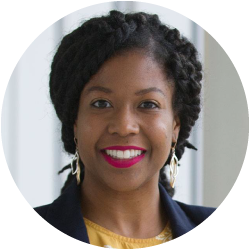
Breanca Merritt (she/her)
“I’m inspired by complex constituent experiences that highlight service gaps we need to address and staff members newly empowered to advocate for systemic change.”
Breanca Merritt, PhD, is Chief Health Equity and ADA Officer for Indiana’s Family and Social Services Administration (FSSA). In this role, she serves as director of FSSA’s Office of Healthy Opportunities, which aims to address social drivers of health for Hoosiers through co-designing and implementing socially equitable policies and programs. Prior to joining FSSA, Breanca was the Founding Director of the Center for Research on Inclusion and Social Policy at the Indiana University Public Policy Institute.
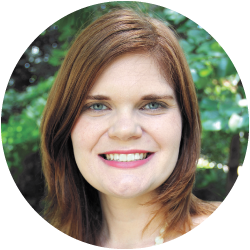
Maggie Middleton (she/her)
“Every day is an opportunity to find a new way to help someone. Even if you don’t meet that goal, there is value in the trying, because the trying helps you get there eventually.”
Maggie Middleton, JD, MPA, is the Attorney for Special Projects and Strategic Initiatives at the Mississippi Division of Medicaid where she specializes in novel policy and strategic planning. Prior to this role, she spent 11 years in federal and state government service combining expertise in litigation, bankruptcy and creditor abuse issues, and innovative Medicaid policies.
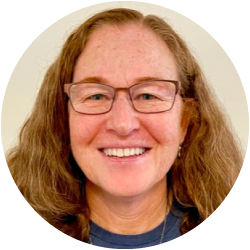
Margaret Mullins (she/her)
“I am inspired to improve the public’s health by identifying and helping to reduce barriers that lead to health disparities across Montana.”
Margaret Mullins, MS, is the Determinants of Health Program Coordinator with the Chronic Disease Prevention and Health Promotion Bureau at the Montana Department of Public Health & Human Services. In this role, she is a primary resource for integrating strategies and practices that cultivate health equity by focusing on the determinants of health in communities around Montana. Margaret has worked in the public health arena for many years, both as an advocate for worker health and safety and in efforts directed at improving patient care. Her current focus is to encourage partnerships between health care and community that will best serve a patient’s needs for total health and well-being.

Viveka Prakash-Zawisza (she/her)
“I am inspired in my work every day by the privilege of creating policy that impacts the health and well-being of vulnerable and marginalized people in my state.”
Viveka Prakash-Zawisza, MD, MS, MBA, is the Senior Associate Medical Director with the MassHealth Payment and Care Delivery Innovation team and is the clinical lead on perinatal health initiatives. She also helps to lead health equity initiatives, such as Trans Health and Member and Community Engagement by creating strategic approaches to include the first-hand perspectives of the most marginalized members of the community. Viveka is an experienced physician leader and innovator with a passion for exploring how policy and systems impact health care delivery and social justice.
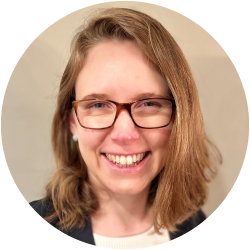
Sarah Qin (she/her)
“At MassHealth, I am inspired by our members, and also the passion, dedication, and determination of my colleagues to provide the best possible care for our members every day.”
Sarah Qin, MBA, is the Deputy Director for Strategic Initiatives at MassHealth, Massachusetts’s Medicaid and CHIP program, in the Massachusetts Executive Office of Health and Human Services, which involves policy development and operationalization of MassHealth health equity efforts, especially relating to the recently signed 1115 waiver. Her role includes managing various health equity efforts of 61 acute care hospitals and 17 accountable care organizations across the state, as well as MassHealth’s data strategy for demographic data. Prior to joining MassHealth in 2019, her work included supporting the Autism Friendly Initiative at Boston Medical Center, working for a health economics consultancy, and mentoring international students through their journey to accessing an American higher education.
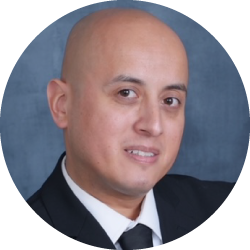
Ruben Soliz (he/him)
“I’m inspired by the memory of a playground rebellion that I led as a fifth grader. It resulted in a policy change and reminds me that even the most marginalized among us can champion justice.”
Ruben Soliz, MPH, is the Federal Relations and Health Policy Advisor for Arizona’s State Medicaid Program, the Arizona Health Care Cost Containment System (AHCCCS). With 15 years of experience in health and human services, he has tirelessly advanced the policy objectives of improving access to care, ending homelessness, and youth development.
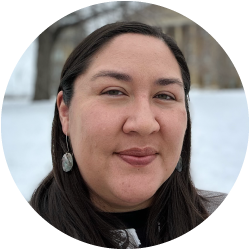
Oliviah Walker (she/her)
“Every day I have the honor to plant seeds of knowledge, watering and cultivating people to understand and prioritize the work required to build a more just society.”
Oliviah Walker, MEd, is the Health Equity Officer at the Office of Health Equity at Iowa Health and Human Services, where she is responsible for leadership and oversight of health equity strategy and initiatives. Prior to this role, she served in local, tribal, and state government working on complex issues, including institutional change work, community health improvement, youth development, racial equity training, and workforce development. Oliviah is a citizen of the Meskwaki Nation.
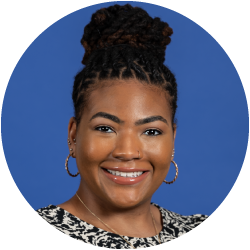
Nicolette E. Wise (she/her)
“I am inspired by the increased focus on social determinants of health and health equity and how they will foster avenues for individuals to reach their full health potential.”
Nicolette Wise, MPH, CHES, is the Social Determinants of Health Director at TennCare, Tennessee’s Medicaid agency, where she leads efforts to address social risk factors and health equity for 1.4 million Tennesseans. Nicolette enacts her passion for public health and personal charge as a woman of color to implement innovative approaches to holistically address health equity in historically underserved and marginalized populations.




